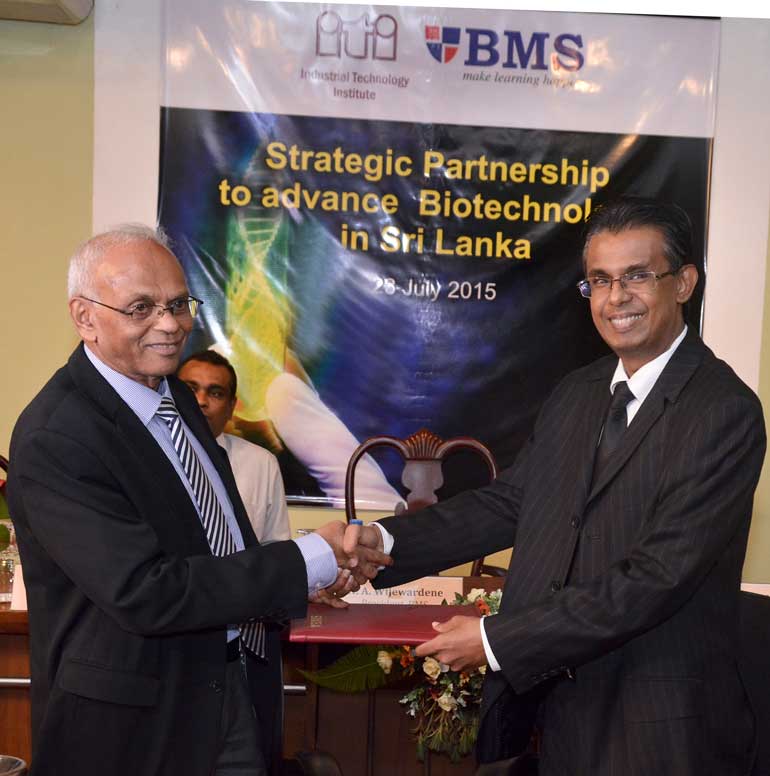Thursday Feb 19, 2026
Thursday Feb 19, 2026
Monday, 27 July 2015 00:00 - - {{hitsCtrl.values.hits}}
 BMS President W. A Wijewardene (left) and ITI Chairman Niroshana Perera exchange the agreement Pic by Upul Abayasekara
BMS President W. A Wijewardene (left) and ITI Chairman Niroshana Perera exchange the agreement Pic by Upul Abayasekara
By Waruni Paranagamage
The Business Management School (BMS) recently signed a Memorandum of Understanding (MOU) with the Industrial Technology Institute (ITI) for continued collaboration in student apprenticeship and training and researches.
The MOU was signed by BMS President W.A. Wijewardena on behalf of BMS and by ITI Chairman Niroshana Perera on behalf of ITI, at the BMS premises.
The MOU is a path-breaking Public Private Partnership (PPP) between BMS and ITI forming a strategic partnership between the two institutions to further biotechnology in Sri Lanka.
The collaboration will provide apprenticeship and training to BMS students in ITI who are reading for the BSc (Hons) Degree in Biomedical Science/Biotechnology in its modern laboratory facilities in Colombo as well as in the new complex to be opened in Malabe.
The partnership will provide research collaboration between the faculty members of BMS and ITI researchers on one hand and researchers of Northumbria University and ITI researchers on the other to further knowledge in the key areas.
Addressing the gathering, Wijewardena said that the partnership would give the BMS students to develop their knowledge under the guidance of well experienced team in ITI and access for modern laboratory facilities available in ITI.
BMS, a premier higher learning institution in Sri Lanka, is the Regional Centre of the UK based Northumbria University for Sri Lanka and the Maldives. It takes pride in launching the first ever Higher National Diploma in Biomedical Science in October 2010 and Higher National Diploma in Biotechnology in October 2013. Both Diplomas, accredited by UK’s Edexcel, are recognised by Northumbria University as equivalent to the first two year study programmes in the BSc (Hons) Degree in Biomedical Science and the BSc (Hons) Degree in Biotechnology, respectively.
“This is an excellent opportunity to put three brains together – ITI, BMS and Northumbria University – to build up new scientific base for Sri Lanka. We cannot achieve economic growth without having research developments in the country. We have been concentrating on garments and coconuts exportation which is using very small technologies for the process. Hence, contribution of export earnings to GDP has declined,” Wijewardena pointed out.
He said that Sri Lanka needed research developments in biomedical science and the increase of budget allocation from the GDP for the research developments in order to have economic growth in the country.
Satisfied with the quality standards maintained by BMS in the Higher National Diploma in Biomedical Science, Northumbria University agreed to allow BMS to conduct the final year of its BSc (Hons) Degree in Biomedical Science at BMS’s state of the art School of Science in Sri Lanka as from October 2015.
Accordingly, the students completing the diploma programs at BMS are allowed to proceed to the final year of the respective degree program of the Northumbria University. So far, about 500 students from Sri Lanka and the Maldives have completed the diploma programs and of them, about 100 students have completed the degree program at the Northumbria University.
ITI Chairman Niroshana Perera said that ITI was a multidisciplinary institute and that the partnership would give benefits to both parties to develop a new scientific base in the country.
“The signing of an agreement between the two institutions is a stepping stone. I would like to mostly welcome BMS for similar partnerships with ITI, where both institutions will one day reap the benefits,” Perera added.
ITI is the premier research institution in Sri Lanka functioning under the Ministry of Higher Education and Research. It is credited with several path-breaking research outputs for the development of the country’s industry sector, the mandate assigned to it by the Science and Technology Development Act No. 11 of 1994 under which it has been set up. It has been assigned with several key objectives and functions of which two important functions are to conduct research with a view to accelerating industrial technology development and undertake training of persons in areas related to its experience.